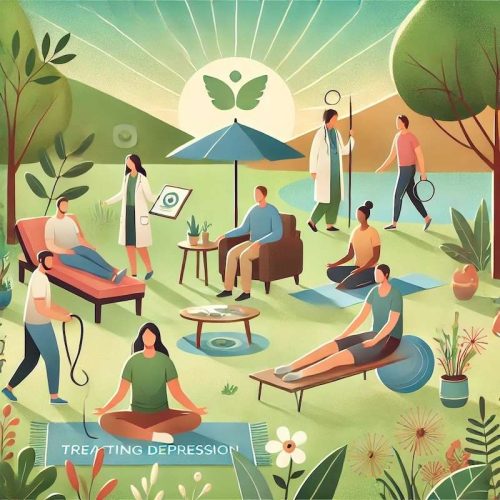Living in a foreign country can be exciting, but it also comes with its own set of challenges. For some, these challenges can contribute to feelings of sadness or even lead to depression. Understanding the symptoms of depression and knowing the available treatment options can be the first step toward reclaiming your well-being. This article will explore the signs of depression, effective psychotherapies, and other comprehensive approaches to treatment to help you or a loved one navigate this difficult experience.
What is depression?
Depression is a complex mental health condition that affects people on multiple levels—emotionally, cognitively, physically, and behaviorally. It is more than just feeling sad or going through a rough patch. Depression can impact every part of your life, from your relationships to your work or studies. Understanding its symptoms and knowing that there are effective treatments available is essential to finding a path to recovery.
Symptoms of depression
Depression shows up in different ways for different people. Recognizing the signs is crucial to getting the help you need. The symptoms of depression can be divided into four main categories: emotional, cognitive, physical, and behavioral.
Emotional symptoms
- Persistent sadness and hopelessness: Many people with depression feel a deep sense of sadness, emptiness, or despair that doesn’t seem to go away, no matter what they do. This can last for weeks, months, or even longer.
- Loss of interest or pleasure (anhedonia): A core symptom of depression is losing interest in activities or hobbies that used to bring joy. Whether it’s socializing, exercising, or enjoying a hobby, everything feels like a burden.
Cognitive symptoms
- Negative thought patterns: Depression can distort your thinking, making you overly critical of yourself and focusing only on the negative. You may feel worthless, excessively guilty, or stuck in a cycle of self-criticism.
- Difficulty concentrating: Depression often brings cognitive challenges like trouble concentrating, making decisions, or remembering details. These issues can make it difficult to keep up with work, studies, or personal tasks.
Physical symptoms
- Fatigue and low energy: Feeling constantly tired, even without exerting yourself, is common in depression. This fatigue can make daily activities feel like an uphill battle.
- Sleep disturbances: Whether you find it hard to fall asleep (insomnia) or sleep too much (hypersomnia), sleep problems are a hallmark of depression.
- Changes in appetite and weight: Depression can affect your appetite, leading to significant weight loss or gain. Some people may lose their appetite, while others might eat more to cope with their feelings.
Behavioral symptoms
- Social withdrawal: Depression often causes people to pull away from friends, family, and social activities, leading to increased isolation.
- Reduced activity levels: Many individuals experience a slowdown in physical and mental activity. This can manifest as slower speech, movements, or thought processes.
- Suicidal thoughts: In severe cases, depression can lead to thoughts of self-harm or suicide. This is a serious symptom that requires immediate professional attention.
Recognizing these symptoms early is essential to getting the right help. Remember, if you or someone you know is experiencing suicidal thoughts, reach out to a professional immediately.
Psychotherapy for depression: effective treatment options
Psychotherapy plays a central role in treating depression, particularly when dealing with its emotional and psychological aspects. Different types of therapy offer unique benefits, which can be tailored to each person’s needs.
Cognitive behavioral therapy (CBT) for depression
Cognitive behavioral therapy (CBT) is one of the most researched and widely used methods for treating depression. CBT helps people recognize and change negative thought patterns and behaviors that contribute to their depression.
- How it works: CBT focuses on identifying distorted thinking patterns and replacing them with healthier, more constructive thoughts. It also involves learning practical skills to handle stressful situations more effectively.
- Why it’s effective: Studies show that CBT is as effective as antidepressants for mild to moderate depression and helps reduce the risk of relapse after treatment ends. This makes it an excellent option for long-term management.
Interpersonal therapy (IPT): strengthening relationships to improve mood
Interpersonal therapy (IPT) focuses on how relationships and life events affect one’s mood and can contribute to depression. This therapy aims to improve communication skills and help resolve conflicts that might be exacerbating depressive symptoms.
- How it works: IPT involves working through significant life events, such as a breakup, the death of a loved one, or adjusting to a new environment (like moving to a new country for work or study), which might be contributing to the depression.
- Why it’s effective: Research shows that IPT is particularly useful for those whose depression is closely linked to life events or changes. It can be used alone or alongside medication to improve mood and interpersonal functioning.
Mindfulness-based cognitive therapy (MBCT): staying present to prevent relapse
Mindfulness-based cognitive therapy (MBCT) combines elements of cognitive therapy with mindfulness practices. This approach helps people become more aware of their thoughts and feelings, promoting a non-judgmental, present-focused mindset.
- How it works: MBCT teaches mindfulness techniques to prevent the escalation of negative thinking patterns that can trigger a depressive episode.
- Why it’s effective: Research, including studies published in The Lancet, suggests MBCT is as effective as maintenance antidepressant medications in preventing relapse, especially for those with a history of recurrent depression.
Other treatment options for depression
While psychotherapy is a cornerstone of depression treatment, it is often most effective when combined with other methods.
Antidepressant medications
Antidepressants are often prescribed to manage the brain’s chemical imbalances that contribute to depression. Common types include SSRIs and SNRIs, which help alleviate core symptoms.
- Combination with psychotherapy: Many people find that the best results come from combining medication with psychotherapy. Medication can help stabilize mood, making it easier for patients to engage in and benefit from therapy sessions.
Lifestyle modifications: supporting your mental health
Simple lifestyle changes can also play a significant role in managing depression. Here are some strategies that might help:
- Regular exercise: Physical activity has been shown to boost mood by increasing endorphins and other “feel-good” chemicals in the brain.
- Healthy diet: Eating a balanced diet rich in omega-3 fatty acids, vitamins, and minerals can positively affect mood and energy levels. Good nutrition supports overall brain health.
- Sleep hygiene: Establishing a regular sleep routine can significantly reduce symptoms of depression. Ensuring you get enough sleep and maintaining good sleep hygiene practices is vital for overall well-being.
Electroconvulsive therapy (ECT): a last resort for severe cases
Electroconvulsive therapy (ECT) is a more intensive treatment option used primarily for severe cases of depression that have not responded to other treatments. ECT involves inducing a brief seizure in the brain under controlled conditions.
- Why it’s effective: Despite its controversial history, ECT has a high success rate, particularly for individuals with severe, treatment-resistant depression. It is generally considered when other treatments have failed or when there is an immediate risk of suicide.
Emerging treatments: new hope for depression
Innovative treatments are offering new hope for those who haven’t found relief through traditional therapies.
- Transcranial magnetic stimulation (TMS): TMS uses magnetic fields to stimulate specific areas of the brain associated with mood regulation. It is a non-invasive procedure and has shown promise in treating treatment-resistant depression.
- Ketamine therapy: Originally used as an anesthetic, low doses of ketamine have been found to produce rapid antidepressant effects, especially in cases of severe depression and suicidal ideation.
Integrating treatments for a holistic approach
A comprehensive treatment plan for depression often integrates multiple approaches to address all facets of the condition. This might include a combination of psychotherapy, medication, lifestyle changes, and, in some cases, more intensive treatments like ECT or emerging therapies. The goal is to create a personalized plan that meets each individual’s unique needs, ensuring the best possible outcome.
Conclusion
Depression can be a complex and deeply personal experience, but effective treatments are available. Psychotherapy methods such as CBT, IPT, and MBCT can help individuals understand and manage their depression. When combined with other treatments like antidepressants, lifestyle modifications, and emerging therapies, psychotherapy offers a comprehensive path to recovery.
If you’re living in Italy and feeling overwhelmed, know that help is available. Book your first free consultation call with a multilingual psychotherapist at Therapsy to explore your options and take the first step toward healing.












